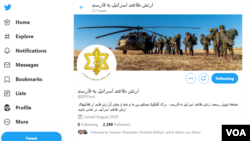This article originated in VOA's Persian service.
Iran's state-run media have responded with near silence to the Israeli military's launching Farsi social media channels to try to convince Iranians that their Islamist rulers are to blame for tensions with Israel.
The Israel Defense Forces, or IDF, began posting content on Farsi-language Twitter and Instagram accounts on Aug. 21 and six days later opened a Farsi channel on Telegram, a messaging app popular with Iranians who access it using virtual private networks to circumvent a government ban on the service. The Twitter and Instagram accounts had gained more than 2,200 and 400 followers respectively by Friday, while the Telegram channel had more than 4,100 members.
"The people of Iran deserve to hear the truth and that's exactly what we will share," the IDF tweeted on Wednesday as it formally announced the new Farsi platforms. "Iranians can follow @IDFFarsi to see for themselves that they [Israeli forces] are not the enemy, the oppressive Iranian regime is."
A VOA Persian survey of major Iranian state-run news outlets found that none of them had made online references to the Israeli military's new Farsi social media channels by Friday.
Only Tabnak, a state-approved news site affiliated with the former head of Iran's Islamic Revolutionary Guard Corps (IRGC), Mohsen Rezaee, had posted an article on the topic. In the Friday report, Tabnak tried to analyze the reasons for the IDF's following the U.S. military's example by communicating in Farsi on social media. The U.S. military's Central Command has been tweeting in Farsi since 2011.
The Tabnak article described the IDF's new Farsi outreach as an effort to intimidate Persian-speaking social media users with posts about Israel's military and intelligence capabilities.
Iran's media rarely cite the Farsi platforms of state bodies and state-funded news outlets from countries it deems hostile, such as Israel and the United States.
Besides Hebrew, English and Farsi, the IDF also has been operating social media accounts in Arabic, French and Spanish.
Other Israeli state bodies have been running Farsi-language social media channels for several years. The Israeli Foreign Ministry's Farsi platforms include a Twitter account with 120,000 followers, an Instagram account with 293,000 followers and a Telegram channel with 23,000 members. Israeli Prime Minister Benjamin Netanyahu also has drawn 38,000 followers to his Farsi Twitter account since opening it in 2015.
So far, the IDF has used its Farsi social media channels to share infographics about IRGC Quds Force operatives who it says have been plotting with Lebanese militant group Hezbollah to attack Israel with drones from Syria and with precision missiles developed in Lebanon.
Other IDF Farsi posts have featured video and photos of young Israeli military personnel training, saluting and working with children.
The IDF's Farsi account also has adopted a practice used on its accounts in other languages — trolling, or posting snarky comments about critics or enemies of Israel.
In one tweet posted Wednesday, the IDF posted a Middle East map highlighting Iran and Syria in red, with arrows pointing toward Iran accompanied by Farsi text saying "Iran is here," and an arrow pointing to Syria with a note saying, "Not here."
The IDF accompanied its map with a Farsi message, in which it used a Persian proverb to say that everyone should go back to their homes. It directed the message at Mohammad Imani, a pro-Iranian-government social media user who describes himself as a journalist. Imani replied with a tweet accusing Israel of plotting to conquer the region and questioning the right of a country with European, African and American immigrants to comment on West Asian affairs.
Israel long has criticized Iran's deployment of forces to Syria where they have backed up Syrian President Bashar al-Assad in his eight-year civil war against rebel groups. The Israeli government sees the Iranian presence in Syria, which borders Israel to the north, as an existential threat because Iranian leaders have repeatedly called for the Jewish state's destruction and described their involvement in the Syrian conflict as a means to that end.
In a message to VOA Persian, former IDF spokesman Peter Lerner, who led its social media team from 2013 to 2017, said the launch of Farsi social media channels was a "great idea" that he first raised six years ago.
"It expands the IDF's reach to people … and broadens the conversation," Lerner said. "I would expect [the Farsi platforms] to [post content] on a spectrum between hope and deterrence, [and to be] provocative, thoughtful, informative and expose more about Israel."




